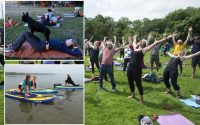Best sleeping position to prevent wrinkles, fine lines, asymmetry
How you sleep is written all over your face.
Side sleeping, experts warn, can expedite the development of fine lines, wrinkles and asymmetry that come with aging — due to excess pressure on the face.
“This is the reason why people find one of their eyes is a slightly different shape, or that one side of their lips is lower than the other,” Dr. Maryam Zamani, a UK oculoplastic surgeon and facial aesthetics doctor, told the Mirror this week.
“As we age, asymmetries become increasingly more apparent and, furthermore, skin elasticity decreases, which means it can take more time for static lines to rehydrate and bounce back after a night of sleep.”
TikToker @mariii_chaa learned this lesson the hard way when one of her followers pointed out her lopsided facial features, which she admitted was one of her “biggest insecurities.”
“Quick answer: side sleeper,” the creator wrote on the September clip, which drew 15.1 million views as she showed herself analyzing her asymmetry using the inverted filter.
While the TikToker’s right and left profile contrast seems extreme, experts stress side sleeping could pose a risk for beauty gurus desperate to keep up their appearances.
“Almost every derm can identify which side a person sleeps on when they come in for fillers,” Dr. Dhaval Bhanusali, an NYC board-certified dermatologist, told Allure.
The grim reality is a nightmare for people who can only catch some Zs while lying on their side: Back sleeping is best.
“As far as the skin-friendliest way to face, sleeping on your back with your head facing out and center will definitely reduce the risk of developing sleep-related skin problems to the greatest degree,” NYC board-certified dermatologist Dr. Rachel Maiman told Allure.
But not everyone can snooze laying flat on their back, which is why “pillow science needs to get better,” Maiman noted.
“With age, our neck and body joints need increasingly more support, but too many pillows can exacerbate these problems,” she added.
For those who refuse to give up their cozy, side-sleeping habits, applying moisturizers, hyaluronic acid, retinol or even a silicone pad on the face or neck can prevent unwanted skin creases caused by pressure on the pillow.
“In the morning, an LED-based at-home device can be a huge help in combating everything from fine lines and wrinkles to inflammatory reactions like acne and heat rash,” said Maiman.
“Add your best serums or masks, and never, ever, ever forget to finish off your treatment — and any morning routine — with sun protection.”


